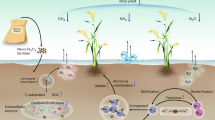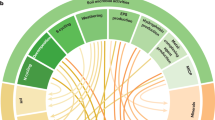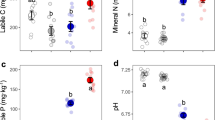Abstract
IN view of the serious losses to crops caused by eelworms, and the possibility that their destruction by predacious fungi may be of potential value as a means of control, some knowledge of the natural occurrence of these fungi in arable soil is desirable. The results set out below are those of a survey carried out on forty-nine samples of soil from various parts of England. The samples were taken from arable land, much of which was infested with potato root eelworm or cereal root eelworm, and from glass-houses in Warwickshire in which tomatoes were the principal crop, and in many of which the potato root eelworm was causing damage.
This is a preview of subscription content, access via your institution
Access options
Subscribe to this journal
Receive 51 print issues and online access
$199.00 per year
only $3.90 per issue
Buy this article
- Purchase on Springer Link
- Instant access to full article PDF
Prices may be subject to local taxes which are calculated during checkout
Similar content being viewed by others
References
Duddington, C. L., Trans. Brit. Mycol. Soc., 34, 322 (1951).
Duddington, C. L., Trans. Brit. Mycol. Soc., 34, 598 (1951).
Author information
Authors and Affiliations
Rights and permissions
About this article
Cite this article
DUDDINGTON, C. Nematode-destroying Fungi in Agricultural Soils. Nature 173, 500–501 (1954). https://doi.org/10.1038/173500a0
Issue Date:
DOI: https://doi.org/10.1038/173500a0
This article is cited by
-
Nematophagous fungi of agricultural soils I
Mycopathologia et Mycologia Applicata (1971)
-
Predacious fungi and nematodes
Experientia (1962)
-
Onderzoekingen over schimmels, die parasiteren op de cyste-inhoud van het aardappelcystenaaltje (Heterodera rostochiensis Wollenw.)
Tijdschrift Over Plantenziekten (1956)
Comments
By submitting a comment you agree to abide by our Terms and Community Guidelines. If you find something abusive or that does not comply with our terms or guidelines please flag it as inappropriate.



